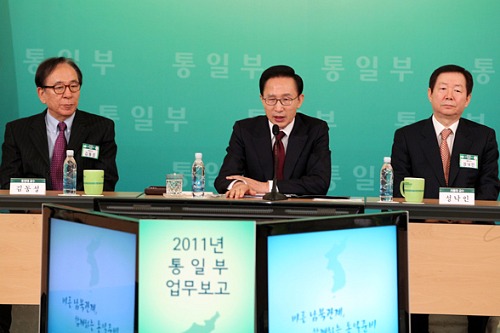한국정부의 대북통일정책 변화 외신 리뷰
<#306 View of Foreign Press>
South Korea’s Changed Unification Policies Make Situation Worse
By Kang Min-hee, Tribune Reporter
Recently, South Korean policies toward North Korea are changing from the “sunshine policy” to a more hard-line policy. On December 27th, 2010, President Lee Myung-bak said, “it is high time that we show solidarity as one so that the North dares not challenge us. Their will to challenge breaks” on a radio address, and on December 29th, the Ministry of Unification pronounced a new unification policy in 2011,“absorption unification” instead of “peaceful unification”. President Lee also used a tough tone to express the need for six-party talks to assist in the denuclearization of North Korea in a New Year’s message. As South Korea has hardened its stance on North Korea, the foreign press has responded to this matter.

Associated Press (AP), an American news agency, on January 1st reported President Lee's radio address with his new tough policies. They also paid attention to recent circumstances around the Korea Peninsula after the artillery shelling of Yeonpyoeng-do. AP delivered a North Korean comment which is about its call for fewer restrictions, and mentioned, ”the danger of war should be removed and peace safeguarded in the Korean peninsula” and “if a war breaks out on this land, it will bring nothing but a nuclear holocaust”. The press also wrote “Washington D.C. and Seoul are insisting that North Korea has to progress on past disarmament commitments and participate in six-party talks”. However, they added “Kim Jong-il did not react and North Korea became armed more heavily”.
Reuters, a global news agency based on London, reported about the new policy on the Korean Peninsula on December 29th, 2010. The articles explained new South Korean policies in accordance with the changes in the Korean Peninsula environment after the artillery shelling of Yeonpyoeng-do and artillery drill. Reuters also covered a national radio address of President Lee Myung-bak against any nuclear program and in favor of “a merciless counterattack” on North Korea for survival of South Korea. Reuters quoted analysts that said “the frequency and severity of aggressive North Korean action had pushed President Lee against a political wall and he had little choice”, so “he pressed ahead with live-fire military drill which was conducted despite diplomatic pressure from China and Russia”.
The People’s Daily, the official newspaper of the Communist Party of China, on December 30th, 2010, dealt with the Korean situation by explaining its modern history from Korean War in the context of political change based on national radio address of President Lee. The newspaper delivered South Korean public opinion by citing The Chosunilbo’s report: “it means that the tone of South Korean government policy toward North Korea has shifted from the current maintenance of stability”. The People’s Daily concentrated on the dispute concerning how unification will be achieved: “absorption unification” or “peaceful unification”. Many points were explained, such as “South Korean economic strength as the foundation for realizing the ‘absorption unification’”, “the prevalence of the theory ’on the collapse of North Korea’” and “American strategy of returning to Asia”.
After the artillery shelling of Yeonpyoeng-do, many articles in the foreign press focused on the Korean Peninsula and they especially paid attention to the change in the unification policy. They think Korea is in a very serious situation, so the change of the unification policy is more important than before. However, North Korea does not want to rejoin international nuclear disarmament talks. If these conflicts continue to escalate, there is no guarantee for our survival and a peaceful life. In this situation, not only relationship between South Korea and North Korea but also six-party talks should start calling for peace.
강민희 기자
mh4261@nate.com

